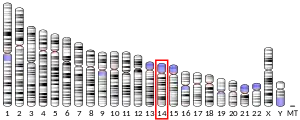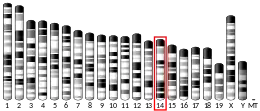NDRG2
Protein NDRG2 is a protein that in humans is encoded by the NDRG2 gene (NMYC downstream-regulated gene 2).[5][6]
Function
This gene is a member of the N-myc downregulated gene family which belongs to the alpha/beta hydrolase superfamily. The protein encoded by this gene is a cytoplasmic protein that may play a role in neurite outgrowth. This gene may be involved in glioblastoma and aggressive meningioma carcinogenesis (via cell proliferation[7]).[8] Several alternatively spliced transcript variants of this gene have been described, but the full-length nature of some of these variants has not been determined.[6]
References
- GRCh38: Ensembl release 89: ENSG00000165795 - Ensembl, May 2017
- GRCm38: Ensembl release 89: ENSMUSG00000004558 - Ensembl, May 2017
- "Human PubMed Reference:". National Center for Biotechnology Information, U.S. National Library of Medicine.
- "Mouse PubMed Reference:". National Center for Biotechnology Information, U.S. National Library of Medicine.
- Kalaydjieva L, Gresham D, Gooding R, Heather L, Baas F, de Jonge R, Blechschmidt K, Angelicheva D, Chandler D, Worsley P, Rosenthal A, King RH, Thomas PK (Aug 2000). "N-myc downstream-regulated gene 1 is mutated in hereditary motor and sensory neuropathy-Lom". Am J Hum Genet. 67 (1): 47–58. doi:10.1086/302978. PMC 1287101. PMID 10831399.
- "Entrez Gene: NDRG2 NDRG family member 2".
- Deng Y, Yao L, Chau L, Ng SS, Peng Y, Liu X, Au WS, Wang J, Li F, Ji S, Han H, Nie X, Li Q, Kung HF, Leung SY, Lin MC (September 2003). "N-Myc downstream-regulated gene 2 (NDRG2) inhibits glioblastoma cell proliferation". Int. J. Cancer. 106 (3): 342–7. doi:10.1002/ijc.11228. PMID 12845671.
- Lusis EA, Watson MA, Chicoine MR, Lyman M, Roerig P, Reifenberger G, Gutmann DH, Perry A (August 2005). "Integrative genomic analysis identifies NDRG2 as a candidate tumor suppressor gene frequently inactivated in clinically aggressive meningioma". Cancer Res. 65 (16): 7121–6. doi:10.1158/0008-5472.CAN-05-0043. PMID 16103061.
Further reading
- Nagase T, Ishikawa K, Kikuno R, et al. (2000). "Prediction of the coding sequences of unidentified human genes. XV. The complete sequences of 100 new cDNA clones from brain which code for large proteins in vitro". DNA Res. 6 (5): 337–45. doi:10.1093/dnares/6.5.337. PMID 10574462.
- Hartley JL, Temple GF, Brasch MA (2001). "DNA cloning using in vitro site-specific recombination". Genome Res. 10 (11): 1788–95. doi:10.1101/gr.143000. PMC 310948. PMID 11076863.
- Wiemann S, Weil B, Wellenreuther R, et al. (2001). "Toward a catalog of human genes and proteins: sequencing and analysis of 500 novel complete protein coding human cDNAs". Genome Res. 11 (3): 422–35. doi:10.1101/gr.GR1547R. PMC 311072. PMID 11230166.
- Zhou RH, Kokame K, Tsukamoto Y, et al. (2001). "Characterization of the human NDRG gene family: a newly identified member, NDRG4, is specifically expressed in brain and heart". Genomics. 73 (1): 86–97. doi:10.1006/geno.2000.6496. PMID 11352569.
- Qu X, Zhai Y, Wei H, et al. (2002). "Characterization and expression of three novel differentiation-related genes belong to the human NDRG gene family". Mol. Cell. Biochem. 229 (1–2): 35–44. doi:10.1023/A:1017934810825. PMID 11936845. S2CID 24226208.
- Ohki T, Hongo S, Nakada N, et al. (2002). "Inhibition of neurite outgrowth by reduced level of NDRG4 protein in antisense transfected PC12 cells". Brain Res. Dev. Brain Res. 135 (1–2): 55–63. doi:10.1016/S0165-3806(02)00300-0. PMID 11978393.
- Strausberg RL, Feingold EA, Grouse LH, et al. (2003). "Generation and initial analysis of more than 15,000 full-length human and mouse cDNA sequences". Proc. Natl. Acad. Sci. U.S.A. 99 (26): 16899–903. Bibcode:2002PNAS...9916899M. doi:10.1073/pnas.242603899. PMC 139241. PMID 12477932.
- Deng Y, Yao L, Chau L, et al. (2003). "N-Myc downstream-regulated gene 2 (NDRG2) inhibits glioblastoma cell proliferation". Int. J. Cancer. 106 (3): 342–7. doi:10.1002/ijc.11228. PMID 12845671.
- Choi SC, Kim KD, Kim JT, et al. (2003). "Expression and regulation of NDRG2 (N-myc downstream regulated gene 2) during the differentiation of dendritic cells". FEBS Lett. 553 (3): 413–8. doi:10.1016/S0014-5793(03)01030-5. PMID 14572661.
- Ota T, Suzuki Y, Nishikawa T, et al. (2004). "Complete sequencing and characterization of 21,243 full-length human cDNAs". Nat. Genet. 36 (1): 40–5. doi:10.1038/ng1285. PMID 14702039.
- Devroe E, Erdjument-Bromage H, Tempst P, Silver PA (2004). "Human Mob proteins regulate the NDR1 and NDR2 serine-threonine kinases". J. Biol. Chem. 279 (23): 24444–51. doi:10.1074/jbc.M401999200. PMID 15067004.
- Mitchelmore C, Büchmann-Møller S, Rask L, et al. (2004). "NDRG2: a novel Alzheimer's disease associated protein". Neurobiol. Dis. 16 (1): 48–58. doi:10.1016/j.nbd.2004.01.003. PMID 15207261. S2CID 26992506.
- Murray JT, Campbell DG, Morrice N, et al. (2005). "Exploitation of KESTREL to identify NDRG family members as physiological substrates for SGK1 and GSK3". Biochem. J. 384 (Pt 3): 477–88. doi:10.1042/BJ20041057. PMC 1134133. PMID 15461589.
- Gerhard DS, Wagner L, Feingold EA, et al. (2004). "The status, quality, and expansion of the NIH full-length cDNA project: the Mammalian Gene Collection (MGC)". Genome Res. 14 (10B): 2121–7. doi:10.1101/gr.2596504. PMC 528928. PMID 15489334.
- Wiemann S, Arlt D, Huber W, et al. (2004). "From ORFeome to biology: a functional genomics pipeline". Genome Res. 14 (10B): 2136–44. doi:10.1101/gr.2576704. PMC 528930. PMID 15489336.
- Hu XL, Liu XP, Lin SX, et al. (2005). "NDRG2 expression and mutation in human liver and pancreatic cancers". World J. Gastroenterol. 10 (23): 3518–21. doi:10.3748/wjg.v10.i23.3518. PMC 4576239. PMID 15526377.
- Devroe E, Silver PA, Engelman A (2005). "HIV-1 incorporates and proteolytically processes human NDR1 and NDR2 serine-threonine kinases". Virology. 331 (1): 181–9. doi:10.1016/j.virol.2004.10.023. PMID 15582665.
- Amente S, Napolitano G, Licciardo P, et al. (2005). "Identification of proteins interacting with the RNAPII FCP1 phosphatase: FCP1 forms a complex with arginine methyltransferase PRMT5 and it is a substrate for PRMT5-mediated methylation". FEBS Lett. 579 (3): 683–9. doi:10.1016/j.febslet.2004.12.045. PMID 15670829.
- Lusis EA, Watson MA, Chicoine MR, et al. (2005). "Integrative genomic analysis identifies NDRG2 as a candidate tumor suppressor gene frequently inactivated in clinically aggressive meningioma". Cancer Res. 65 (16): 7121–6. doi:10.1158/0008-5472.CAN-05-0043. PMID 16103061.
This article is issued from Wikipedia. The text is licensed under Creative Commons - Attribution - Sharealike. Additional terms may apply for the media files.





